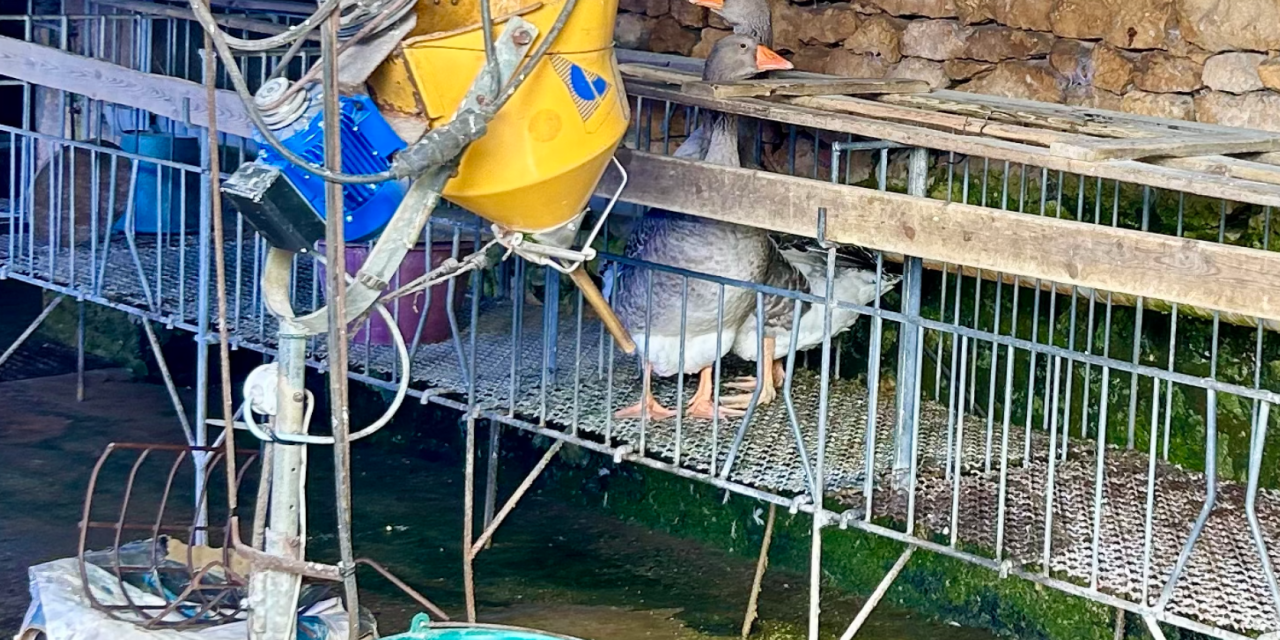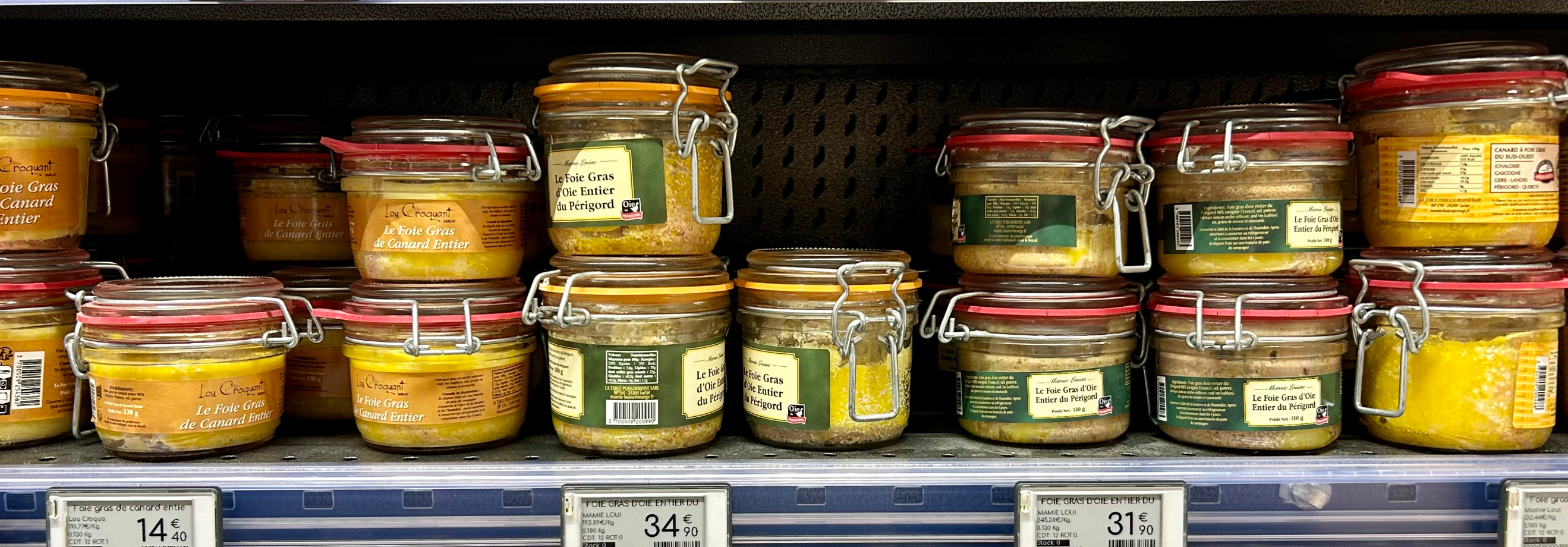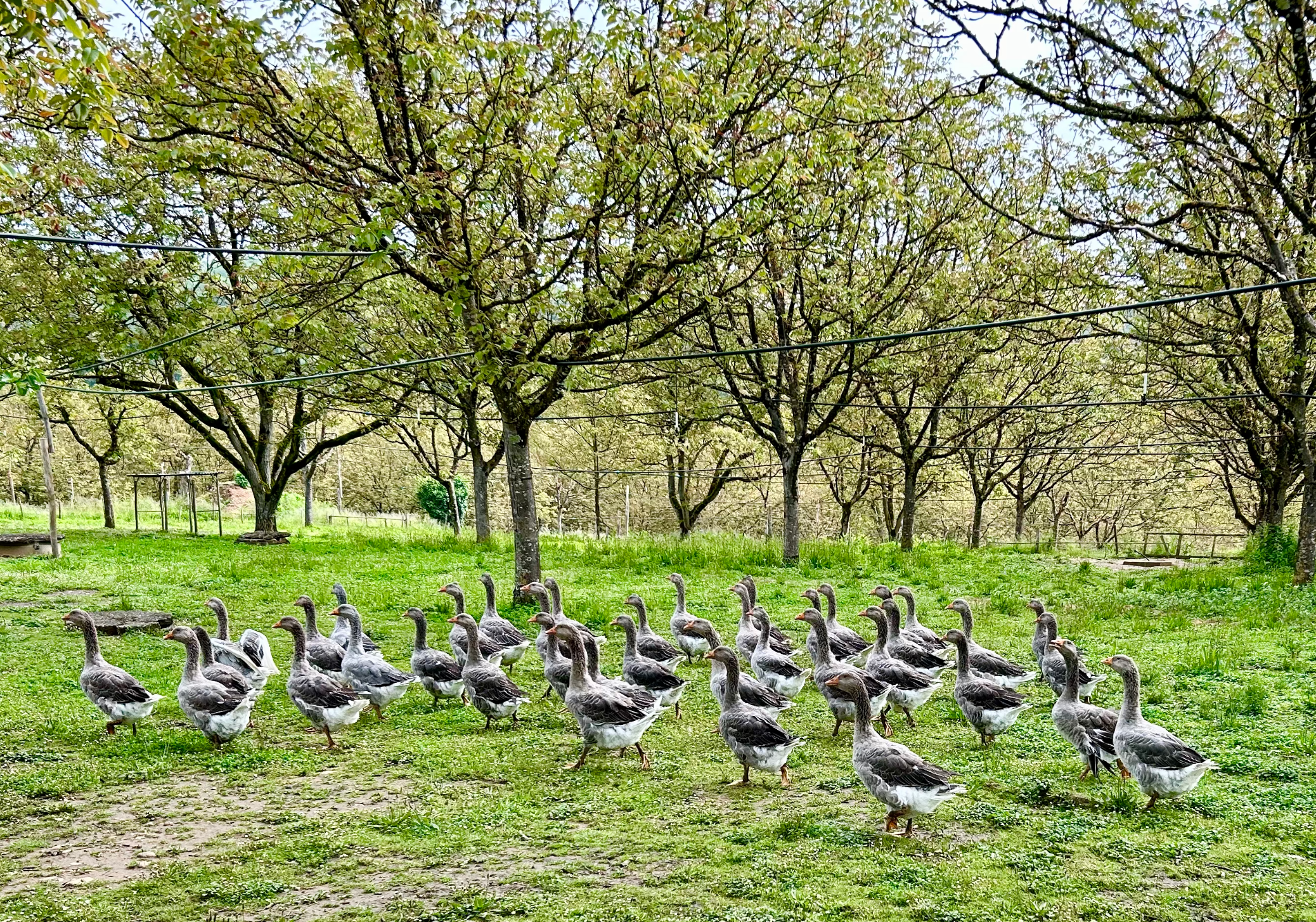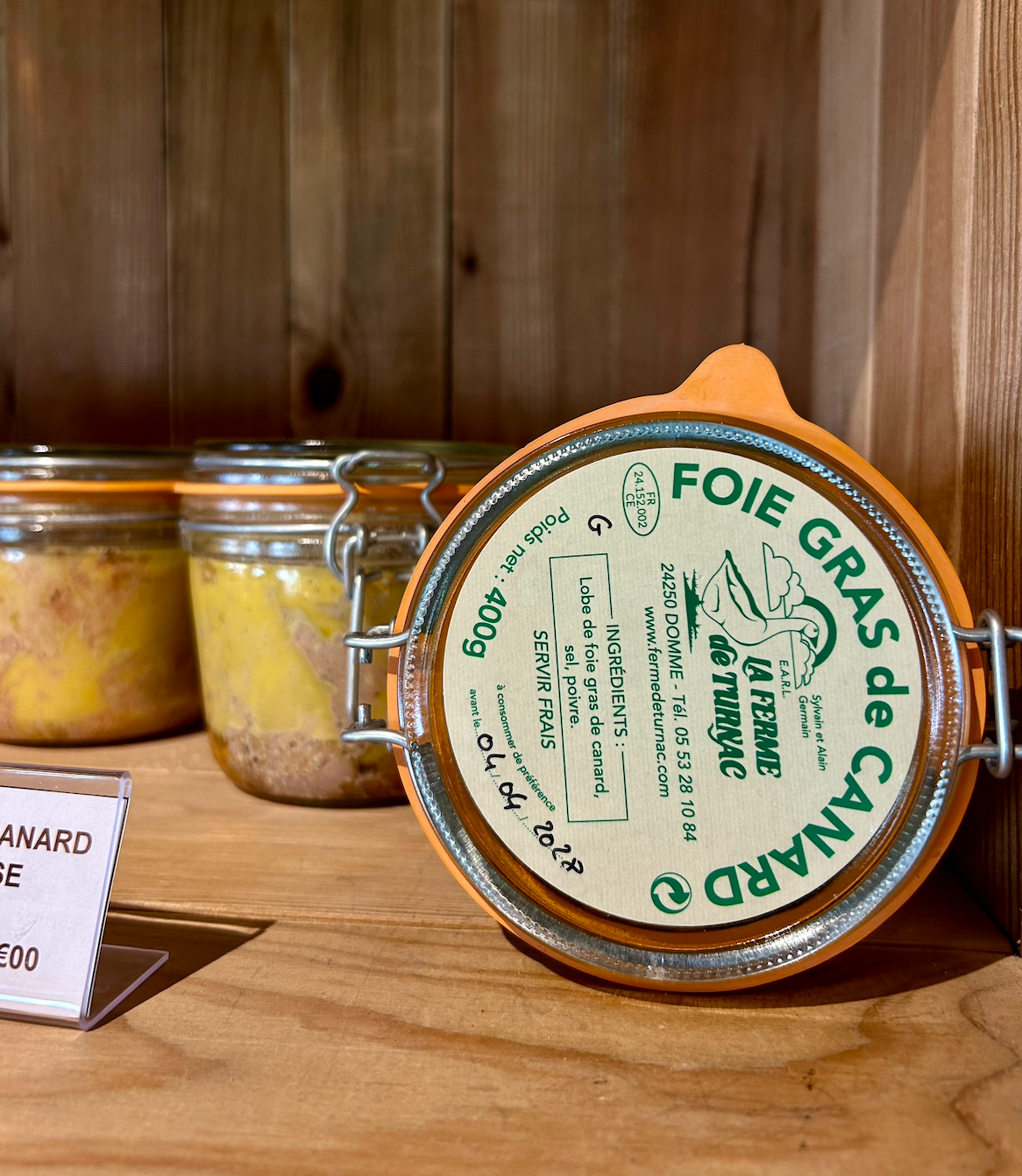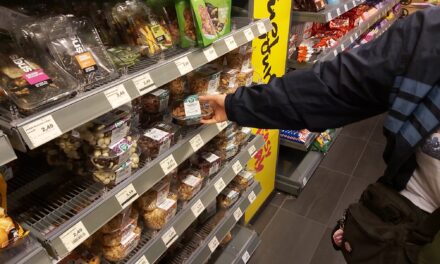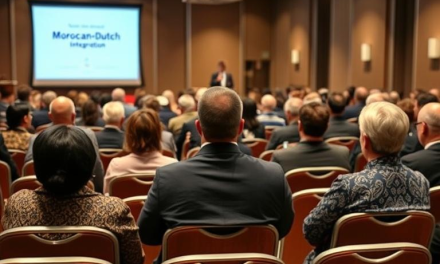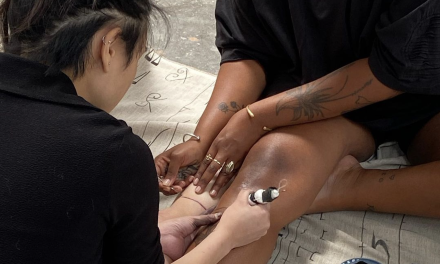"The most dangerous idea in any society is to think: "We have always done it this way" Hila Tal, Food Technology student
The authentic French dish that consists of fatty livers of ducks or geese, also known as Foie Gras. It does not sound very tasty when you describe it like that, does it? That is exactly what vegetarians and many other people think, “animal suffering”, “inhumane” and so on. So for this group of people, it is not surprising that the Foie Gras consumption overall has gone from 302.6 grams to 170.18 grams per person per year in 11 years. But what about the French themselves, who really see this as their luxury product and cannot imagine a world without this dish at all? Will the popularity of being vegetarian influence this in the end?
While the sun tries to break through the morning thaw, farmer Sylvain is already on his tractor, driving on the land of the 57-year-old farm in Périgord: la Ferme de Turnac. While some ducks are running across a field on the left, he drives towards the walnut trees on the right, encountering another field of geese along the way.
-
Map of la Ferme de Turnac

-
The breeding process of the animals shown at the farm
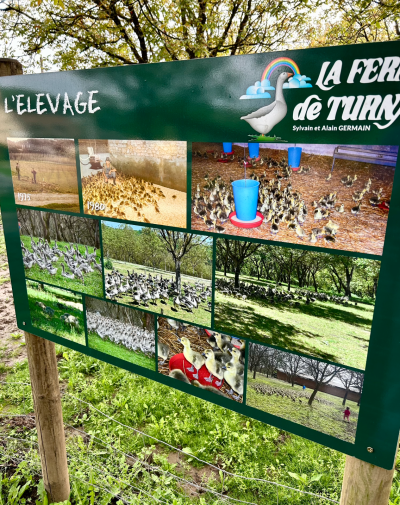
-
The geese walking around at the fields of the farm
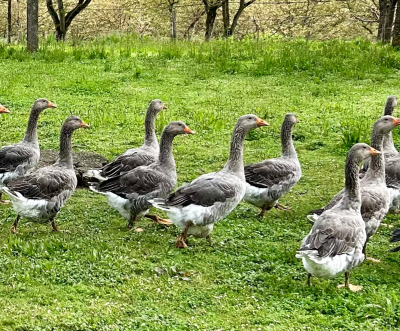
-
The transformation of the Foie Gras explained in pictures at the farm
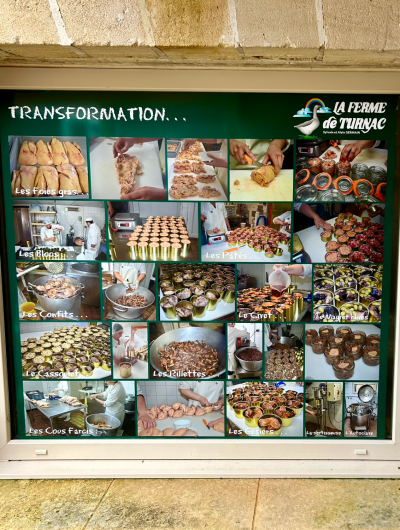
-
Some history of the immigration from the animals
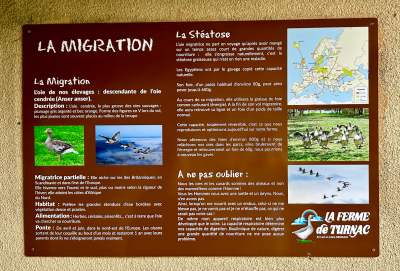
-
On the left the building where the animals are being slaughtered and on the right the shop where the farm sells their product
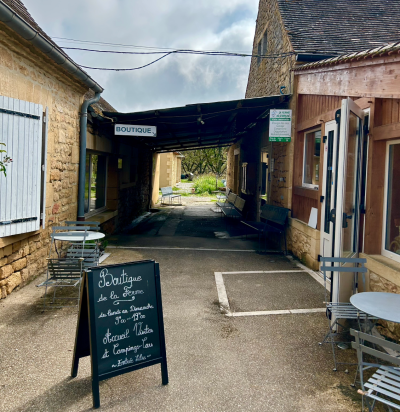
La Ferme de Turnac
The audio below talks more about how the Foie Gras is made at la Ferme de Turnac. Farmer Sylvain also reveals his opinion of the impact of vegetarians on Foie Gras in France. Will they, according to him, have any impact at all?
With the enormous space for the animals and the transparency to guests that the farm gives, it seems that the Foie Gras produced here is very animal-friendly. It probably couldn’t be any better than this for the animals that have been given up for this fatty, typically French dish anyway. So why should there be so much commotion about it?
Looking through the big window of the farmhouse where a woman is peeling off the feathers of the just-killed goose and cleaning it, you may start to wonder things. While the goose is about to be completely taken apart, you start to think how healthy it is that the liver is 10 times larger than the one of a normal geese. Also, didn’t you hear, while a funnel was being stuffed in a duck’s mouth with corn, some gasping for breath?
“Making Foie Gras is obviously out of this day and age and just seriously unfriendly,” says Camiel Kesbeke of Foie Royale. The Dutch company Foie Royale decided to produce animal-friendly Foie Gras through pascalisation: a process in which, in a factory in Germany, fat and liver from the goose are pressed together under extreme pressure to almost the same texture as real Foie Gras. That it is not allowed to simply have the name “animal-friendly Foie Gras” is because you can only call the dish Foie Gras if the animals endure three-day force-feeding. Initially, during ancient Egypt, geese were commonly force-fed, even though they make up less than 10% of Foie Gras production. Ducks actually make up the majority. According to a report of Cambridge University, in 2001, over 35 million ducks were force-fed in France representing nearly 95% of the country’s foie gras production!
While the ducks at la Ferme de Turnac are running around, unaware that in a few weeks they will be heading towards force-feeding and the end of their lives after this period is in sight, several families are looking around in this farm. A young English child asks her mother why those geese and ducks in the covered building make much more noise than the ones she just walked past outside. The mother answers her that it is because the beasts are enjoying the corn husk brought to them in this building. She says this with some doubt in her voice, which the child does not realise. The mother walks towards one of the explanation signs hanging on the farm. This sign tells what force-feeding is like through pictures. Doubtingly, her eyes move from the sign to the inside of the wooden building, it seems as if she wonders whether the animals in here really enjoy this forced feeding so much.
-
Painting of how the force-feeding goes
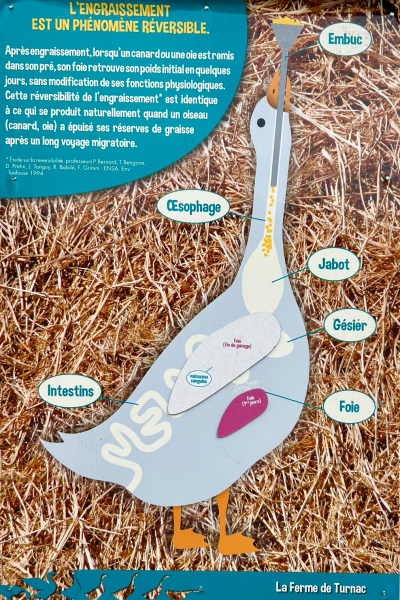
-
The building where the force-feeding happens
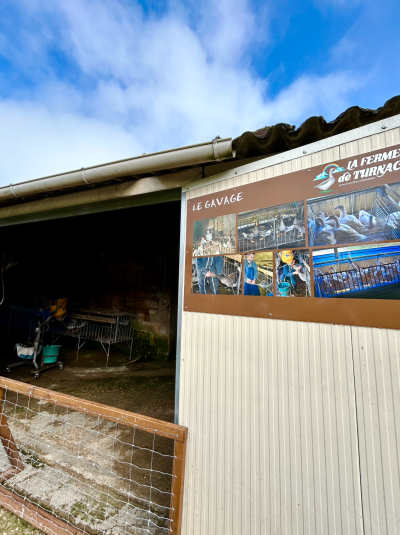
-
Some animals waiting to be force fed
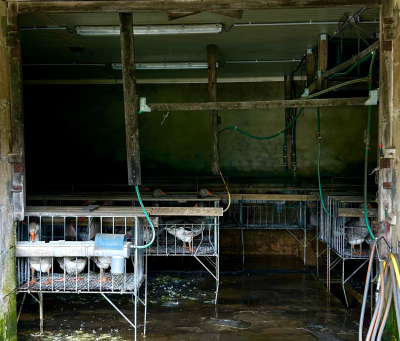
-
The building where the animals are being slaughtered, cleaned and taken apart
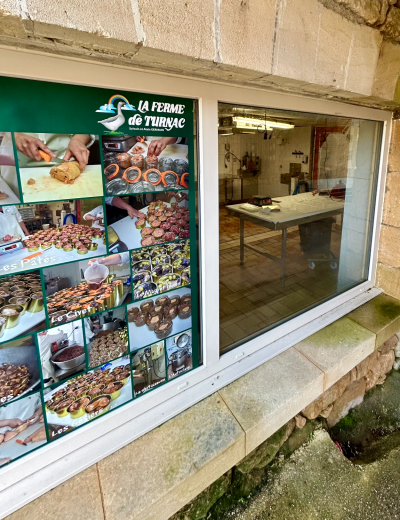
-
Video that the farm shows of how the animal is seperated in different parts
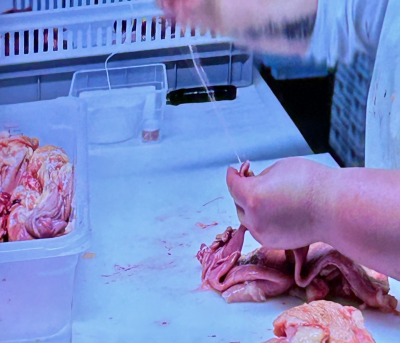
-
Some of the animal livers shown on the movie at the farm
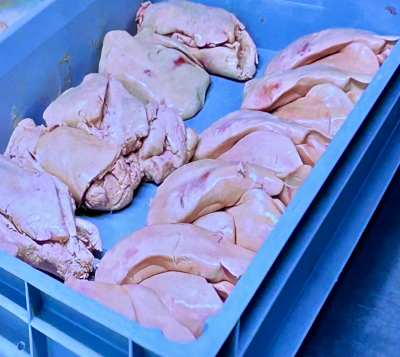
“Force-feeding ducks and geese for Foie Gras is not a positive thing! I understand that the industry in France is very successful in misleading people but there is a difference between killing animals for consumption and force-feeding until animals’ livers are 10 times larger than normal. Those are two very different dimensions,” Ann de Greef of Faux Gras de Gaia, a Belgian company that makes vegetarian Foie Gras based on champagne and truffle, fiercely exclaims.
Ann de Greef is not the only one who is so vehemently opposed to the production of Foie Gras. She mentions that, as a vegan, she may have a somewhat one-sided opinion but seeing that only five of the 27 member states in the European Union still legally allow the production of Foie Gras because they don’t have the animal welfare standards set by the European Welfare Quality project, does show that more people share this opinion.
As Mauricette, a French resident, said in the audio, in France there are “unfortunately” no political parties that now really defend animals, or if there are, they are very much in the minority. It is therefore natural that France approves the production of Foie Gras. The parties that make the fake or animal-friendly Foie Gras totally disagree. So do vegetarians.
It’s a week later and the sun that shone in France is nothing to be seen in Holland. On a drizzly day, a company is handing out vegetarian Pulled Pork at Utrecht Uithof. They do this for free, so of course as a Dutch person you don’t say no to that! If you would tell every other person that this stew is made of meat from an animal, they would believe it, that’s how real it looks and tastes.
Even Arjo Vink, Food Technology lecturer at The Hague University of Applied Sciences, is amazed about the change in meals over the years. “Whereas before if you were vegetarian in a restaurant you got the well-known salad with goat cheese, now a restaurant has several different meals to offer for all diets. This is due to public acceptance and popularity. When a person becomes vegetarian he/she influences others with this. This makes things publicly accepted and has a chance to succeed”.
If you ask Arjo Vink, he believes that vegetarians have a big influence on the food market around the world. “The manufacturer can produce what the consumer wants, also for a very large group that is against certain animal products. If you see that as a producer or seller you are going to create and sell less of these animal products. You can already see this in the growth of vegan/vegetarian selections in shops”.
Now, if Vink was right, would this also mean that those vegetarians are affecting the Foie Gras industry in France after all? Does the increase in paying attention to food choices and becoming vegetarian, for example, mean that over the years, Foie Gras production will also slowly decrease and perhaps even disappear?
The farm in Perigord has been around for so long that you wouldn’t really expect this centuries-old tradition to ever completely disappear. For these farmers, it would be completely unthinkable. Still, the idea that people are becoming more conscious about their food choices and want to influence others with it is nagging. “Vegetarians can have a big chance to make a change in the Foie Gras market in France by just showing that there are different options, there is another way. They raise awareness and affect customer demand for meat negatively, which is actually positive”, says Food Technology student Hila Tal. Tal has been vegan since 2015, primarily for the animals, followed by additional motives such as environmentalism and health soon later.
So the influence of vegetarians on Foie Gras does exist, Mauricette already mentioned this but so do others like Hila Tal and the makers of animal-friendly and ‘fake’ Foie Gras.
Statistics from Statista Research Department show that the price of Foie Gras per kilo in France in January 2020 was 23,25 euros where it rose to 55,17 euros in January 2023, three years later. This could be because the product is becoming more scarce due to this influence of vegetarians and what Arjo Vink mentioned, the producer then deciding to make less of the product anyway.
There was also 4.444 tonnes less Foie Gras produced in France in 2021 compared to 2019. Bad news for vegetarians is that this is mainly due to an outbreak of bird flu that hit France and not because of their influence.
Is the popularity of vegetarians now so high that it causes Foie Gras production in France to disappear altogether and farmer Sylvain of Perigord to close his farm? No. “If you’ve lived on a farm like that all your life, you don’t know any better either and you’re not open to substitutes. We as the Dutch are already very ‘modern’ with innovation. Like making a Foie Gras without the force-feeding,” added Vink.
Still, because of the popularity of vegetarians, people think more and more consciously about their food choices, and so it is increasingly the case in France. The shelves of supermarket Intermarché have traded half the meat shelf for hummus and other vegetarian spreads. Where this was unthinkable a decade ago, it is now. The real abolishment of Foie Gras production is only possible when it is banned by law. Until that time when that might happen, we’ll see and perhaps in five years’ time the Foie Gras shelf in France will have traded in for Faux Gras!
"Hopefully, the vegetarian mentality becomes more inspiring than horrifying" Lilian Kocsis, Food Technology student
